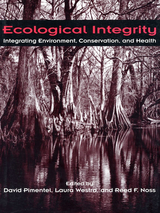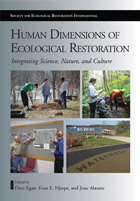
Global Integrity Project has brought together leading scientists and thinkers from around the world to examine the combined problems of threatened and unequal human well-being, degradation of the ecosphere, and unsustainable economies. Based on the proposition that healthy, functioning ecosystems are a necessary prerequisite for both economic security and social justice, the project is built around the concept of ecological integrity and its practical implications for policy and management.
Ecological Integrity presents a synthesis and findings of the project. Contributors -- including Robert Goodland, James Karr, Orie Loucks, Jack Manno, William Rees, Mark Sagoff, Robert Ulanowicz, Philippe Crabbe, Laura Westra, David Pimentel, Reed Noss, and others -- examine the key elements of ecological integrity and consider what happens when integrity is lost or compromised. The book:
- examines historical and philosophical foundations of the concept of ecological integrity
- explores how integrity can be measured
- examines the relationships among ecological integrity, human health, and food production
- looks at economic and ethical issues that need to be considered in protecting ecological integrity
- offers concrete recommendations for reversing ecological degradation while promoting social and economic justice and welfare
Contributors argue that there is an urgent need for rapid and fundamental change in the ecologically destructive patterns of collective human behavior if society is to survive and thrive in coming decades.
Ecological Integrity is a groundbreaking book that integrates environmental science, economics, law, and ethics in problem analysis, synthesis, and solution, and is a vital contribution for anyone concerned with interactions between human and planetary health.

When it comes to implementing successful ecological restoration projects, the social, political, economic, and cultural dimensions are often as important as-and sometimes more important than-technical or biophysical knowledge.
Human Dimensions of Ecological Restoration takes an interdisciplinary look at the myriad human aspects of ecological restoration. In twenty-six chapters written by experts from around the world, it provides practical and theoretical information, analysis, models, and guidelines for optimizing human involvement in restoration projects. Six categories of social activities are examined:
- collaboration between land manager and stakeholders
- ecological economics
- volunteerism and community-based restoration
- environmental education
- ecocultural and artistic practices
- policy and politics
For each category, the book offers an introductory theoretical chapter followed by multiple case studies, each of which focuses on a particular aspect of the category and provides a perspective from within a unique social/political/cultural setting.
Human Dimensions of Ecological Restoration delves into the often-neglected aspects of ecological restoration that ultimately make the difference between projects that are successfully executed and maintained with the support of informed, engaged citizens, and those that are unable to advance past the conceptual stage due to misunderstandings or apathy. The lessons contained will be valuable to restoration veterans and greenhorns alike, scholars and students in a range of fields, and individuals who care about restoring their local lands and waters.
READERS
Browse our collection.
PUBLISHERS
See BiblioVault's publisher services.
STUDENT SERVICES
Files for college accessibility offices.
UChicago Accessibility Resources
home | accessibility | search | about | contact us
BiblioVault ® 2001 - 2024
The University of Chicago Press









